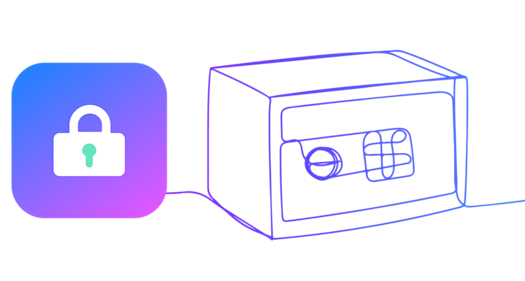Cybersecurity is wildly unfair. A hacker only needs to succeed once to get what they want, while businesses need to succeed every day indefinitely to prevent that from happening.
For cybersecurity professionals and other security experts, security is a day-to-day concern that touches many facets of your work life. After all, putting the data privacy of your customers at the top of your priority list is something that simply comes with the job nowadays. This is often true for professionals working for modern companies, as handling user data and ensuring privacy protection is table stakes in today’s data-driven market.
As the amount of personal data being collected and stored continues to grow, hackers and other bad actors have also become increasingly innovative and harder to detect. This means that diverse types of teams from organizations large and small need to be incredibly wary when it comes to protecting sensitive information – and that data security should occupy the minds of employees from every corner of your business.
Data and cybersecurity shouldn’t just frame your perspective as a security professional, it should also be an ingrained part of your daily practices. That’s where a security mindset comes in.
A security-first mindset isn’t just about ensuring that your company is protected from the threat of data breaches or other forms of data security problems – it’s about understanding our modern-day relationship with data and prioritizing the integrity of both yours and your users’ privacy.
Forming your own security-first attitude will not only help your business’ information security posture, it will also help you protect your personal sensitive data as you venture out into the world.
How to develop a security mindset
As a security professional, a healthy security-first mindset will help ensure that the sensitive data of your users, like personally identifiable information (PII), is protected. As a consumer, carrying this attitude into your personal life comes with the added benefit of safeguarding your sensitive information.
So, how do you develop your own security mindset and put it into practice?
Personal information is powerful: Beware cybersecurity threats
These days, it’s no secret that our personal information is regularly purchased by companies. Information security is not just about protecting abstract credit card numbers and reducing fraud. It must now also combat identity theft.
Data powers today’s most successful corporations, and likely provides a lot of benefit to your own organization. But a lot of consumers, including professionals in the tech industry, aren’t properly informed about how their data is collected, how much it’s really worth, or who gets to see it.
Thanks to the internet, much of the personal information that we enter into online forms has become a valuable commodity that businesses collect themselves or purchase.
In fact, every day there are hundreds of data-scooping companies that are gathering information on you, most of which you’ve probably never heard of.
In the old days, data-collecting companies could simply purchase lists of specific populations, like newspaper subscribers, to construct strategies for targeted advertising audiences. Nowadays, however, simply using a payment card or a smartphone can give these organizations all they need to know about you. Just through these day-to-day activities, companies can find out if we are dating someone new, trying to lose or gain weight, considering a certain type of new medication, whether you swipe or tap your smartphone for transactions if you consider yourself an introvert – the list goes on.
In other words, information security is now required on a massive scale. And the need for quality security is only growing.
All that precious data can be used to generate profiles of each one of us, which are then used to target us with ads or determine our eligibility for an employment opportunity. Mountains of personal data are going directly to political consultants who want to influence our votes, law enforcement agencies, foreign governments, academic researchers, and companies that want to sell to us in a more targeted fashion, among other reasons.
By scraping public records, purchasing or licensing data, third-party data firms can gather thousands of different attributes for millions of people.
This, of course, means that cybersecurity for business has become increasingly complicated. And decision-makers need to understand how data enters and leaves its systems.
How to create your own security-first mindset
As a security professional, a healthy security-first mindset will help ensure that the sensitive data of your users, like personally identifiable information (PII), is protected. As a consumer, carrying this attitude into your personal life comes with the added benefit of safeguarding your sensitive information.
So, how do you develop your own security-first mindset and put it into practice?
Boost cybersecurity through consumer research
There’s a reason these data-harvesting organizations are so keen on capturing and reselling your personal information: it’s valuable.
Just like your personal information, from credit card numbers to social security numbers or any other type of unique identifier to a particular owner, your customers’ information is highly coveted and needs to be protected. It’s useful to consider this predicament from both angles – the point of view of the user and the business.
In order to develop a security mindset to provide good security to your customers as well as your own household, it’s helpful to think about data privacy and sensitive personal information from an average consumer’s perspective. The vast majority of consumers, for example, don’t have faith in the companies that collect their sensitive data.
According to a 2019 study from Pew Research Center, 79% of US adults are “very” or “somewhat” concerned about how companies use their personal data. Moreover, 81% of adults in the US feel like they have little or no control over the information companies are collecting about them.
What is possibly more illuminating is the fact that, in the Pew report, most of the adults surveyed doubted that companies would openly admit to mismanaging their personal data and properly take responsibility for mishaps, with 79% of saying they had little to no confidence that businesses would do the right thing.
Further, with so many data security breaches impacting massive global companies – and getting a lot of media attention – the modern consumer simply wants more ownership of their own sensitive data. They want to control where it goes and dole it out in a granular fashion.
It's clear that modern consumers are skeptical of how businesses handle their personal data, which likely means that your own organization’s users have their own doubts about how their sensitive information is safeguarded.
Understanding your customers’ viewpoint is key to constructing your security-first mindset where their sensitive data is best protected – as well as reducing the likelihood of a data breach or similar cybercrime attack on your company.
Nurture a culture of privacy and reduce cybersecurity threats
As a software security professional or any team member at a typical modern organization, you’ve probably gone through some sort of information security training at your place of work. After all, cybersecurity for businesses is no longer a bonus – it’s mandatory.
From dodging phishing attacks and evading malware to understanding cybersecurity threats in general, there are key behaviors expected of employees designed to protect the integrity of the organization’s information security.
Unfortunately, these tips and tricks are frequently not always followed by everyone – and a single slip-up can lead to unauthorized access by someone you don’t want getting their hands on your business’ sensitive information.
That’s why it’s absolutely vital to make sure that every member of your company understands what security vulnerabilities they face at every click, and it’s much more than privacy settings, antivirus software, passwords and two-factor authentication.
When everyone is on the same page in your day-to-day business environment and the same stringent security-first culture can be observed every day, your security mindset will continue to be fortified.
Without the constant real-world exposure and reassurance of a security mindset at work, your security attitude might start to gradually deteriorate – so making your company’s security-first culture a priority is vital if you want to keep a mindset geared toward absolute protection of sensitive information.
Why a security mindset matters
Solidifying your own security mindset won’t be an overnight journey, and modern consumers’ particular way of relying on tech and internet-based services doesn’t make it any easier to maintain the security mindset and keep your customers’ data safe.
These security problems and information security vulnerabilities impact your own household just like they do your customers’, which makes considering both perspectives a worthwhile endeavor if you’re seeking to prioritize the data protection of your users and minimize your organization’s data breach risk.
By taking the time to develop and nurture this particular mindset, you can be in a much better position to successfully protect the sensitive personal data of your valued customers.
Cyber Security for Business: More than reducing compliance scope
If your business is looking to keep its sensitive data protected and avoid data breaches, adopting a security mindset is only one part of the equation. The second part is implementing the best information security tools that complement that mindset.
While there are many high-quality data security solutions on the market that can help vault payments data or encrypt PII, those same technologies still involve that sensitive data touching your own databases and flowing through your systems.
But what if there was a way to go contactless with sensitive information so that you can use your valuable data without having to take on the liability of storing it or protecting it yourself?
With VGS, it’s possible.
VGS’ Zero Data solutions take data breach risk out of the equation by keeping sensitive data off your company’s systems, ensuring that only the right people see your users’ sensitive information.
Using innovative data aliases, which replace redacted sensitive data in real-time before it ever hits your business, VGS empowers you to collect, store, and transfer as much sensitive information as you want – but without putting the original data at risk.
Even if cybercriminals intercept your sensitive data, the aliases they obtain are useless. Only you have access to the raw sensitive information that you need to protect.
Not only does the VGS Zero Data Platform protect your data and minimize your data breach risk, it also accelerates your path to multiple compliance certifications – like PCI DSS, SOC 2, and more.
Try a demo of VGS by clicking here.



